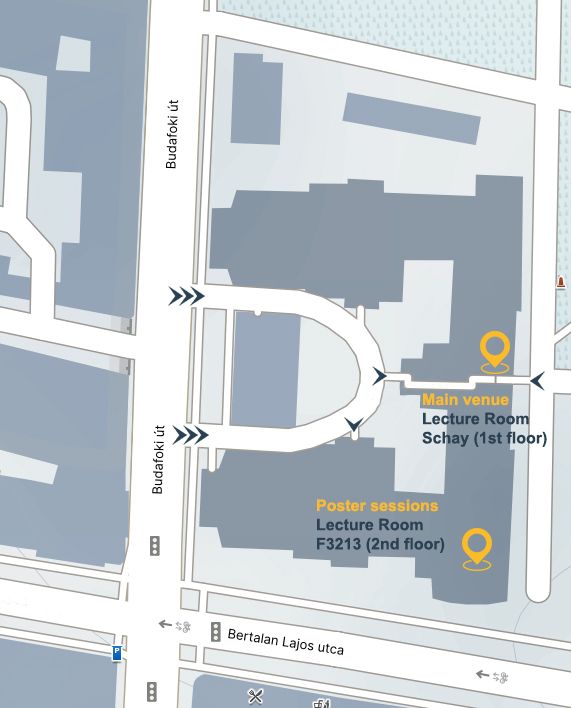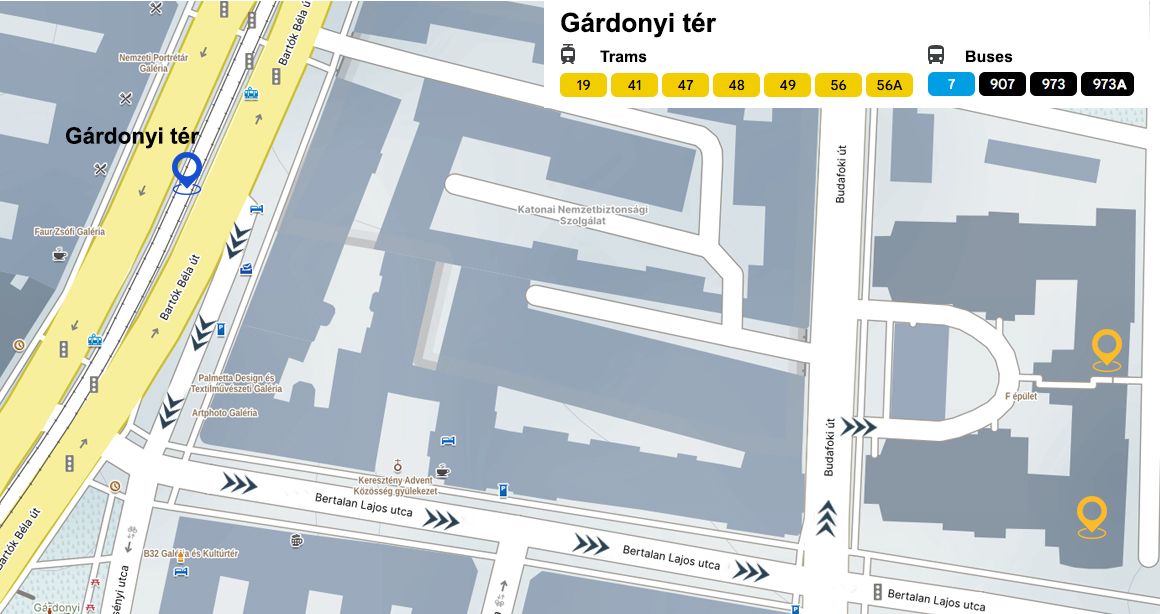International workshop
Physics and Mathematics of Topological Textures
14-16 May 2025 | Budapest, Hungary

Deadlines
14 March 2025:
Application & Abstract Submission28 March 2025:
Notification regarding participation, abstract acceptance.
Invitations to be sent via the e-COST platform.2 April 2025:
Finalization of the participant list.9 April 2025:
Final program published on the website.
Scope
The workshop's goal is to bring together experts from physics, mathematics, and materials science and from diverse communities such as solid state, soft matter, superfluids, optics, to discuss topological textures in a broad sense and from diverse scientific perspectives. We will explore the connections between the different physical systems and create synergies for the description of topological textures.
Various types of topological textures will be discussed, such as magnetic and ferroelectric textures (e.g., skyrmions), quantized vortices in superfluids and superconductors, optical vortices in light fields, topological defects in liquid crystals and soft-matter systems (e.g., dislocations and disclinations), reciprocal-space textures in solids, topological bands in non-Hermitian systems.
The workshop is organized within the COST Action CA23134 Topological Textures in Condensed Matter (Polytopo). It intends to foster discussions and exchange of ideas between experts and early-career scientists. It also serves to promote and disseminate the activities of the COST Action, particularly in Inclusiveness Target countries.
Download the Program & Book of Abstracts (last update: 10.05.2025)
You can find more details about the featured presentations in the e-Book of Abstracts.
Program
Time | Tuesday 13 | Wednsday 14 | Thursday 15 | Friday 16 |
|---|---|---|---|---|
|
09:00 |
Arrival |
Opening |
„Boundary vortices in ferromagnetic thin films" |
„Quantum anomalous Hall effect materials and devices for metrology (QuAHMET): An European Partnership on Metrology project" |
|
09:30 |
|
„Topological dipoles of quantum skyrmions” |
„Discrete-to-continuum variational analysis for Ising and Spin models” |
„The geometry of the Hermitian matrix space and the Schrieffer-Wolff transformation” |
|
10:00 |
|
„Multifunctional spin-wave platform based on hybrid magnonic crystal with confined skyrmions and soft ferromagnetic film” |
„Time-stepping methods for projection-free approximations of evolutionary geometrically constrained partial differential equations” |
„The Frustration of Being Odd” |
|
10:30 |
|
Coffee break |
Coffee break |
Coffee break |
|
11:00 |
|
„Merons in magnets revisited: no need for fractional topological charges” |
„Mathematical analysis of a model for ferronematics in two dimensions” |
„Polarisation textures of light and atomic gases” |
|
11:30 |
|
„Inter-skyrmion forces" |
„Novel Lie-Poisson Algebras" |
„Photonic ferroelectric vortex lattice” |
|
12:00 |
|
Lunch break |
Lunch break |
Lunch break |
|
14:00 |
|
„Curvilinear Magnetism: Fundamentals, Applications and Perspectives” |
„Topological effects of Abrikosov vortices in superconductors” |
„Dipole interactions in chiral ferromagnets" |
|
14:30 |
|
(live streaming) |
„Highway to electrifying skyrmions” |
„Skyrmion lattices for generic DMI" |
|
15:00 |
|
„Ultralow power and ultra-wideband spintronics near thermodynamic limits" |
„Stability of Weyl node merging processes under symmetry constraints" |
„Capturing instantons within the Functional Renormalization Group" |
|
15:30 |
|
Coffee break |
Coffee break |
Coffee break |
|
16:00 |
|
„Dynamics of topological defects in active and driven soft matter" |
Management Committee Meeting |
Working Groups Meetings |
|
16:30 |
|
„Flexoelectric polarization effect on skyrmions in chiral liquid crystals" |
Management Committee Meeting |
Working Groups Meetings |
|
17:00 |
|
Working Groups Meetings |
Management Committee Meeting |
|
|
17:30 |
|
Working Groups Meetings |
Management Committee Meeting |
|
|
18:00 |
Training School |
Poster session |
Core Group Meeting |
|
|
18:30 |
Training School |
Poster session |
Core Group Meeting |
|
Venue
The workshop will be held at the Budapest University of Technology and Economics
(Budafoki út 8., 1111 Budapest, Hungary).

Travel information

Budapest Airport may be reached by direct flights from many cities. It is located around 20 km from the city centre which may be reached by taxi, shuttle, express bus (100E) or by public transport (bus 200E connects to metro line M3).
Budapest may also be reached by train from Central European countries, and the main railway stations are located close to the city centre.
Budapest University of Technology and Economics is located on the bank of the river Danube. There are several hotels within walking distance on both sides of the river. It is also accessible by public transport, including metro line M4 and several tram lines.
Budapest University of Technology and Economics
Budafoki út 8., 1111 Budapest, Hungary

Important notes
-
Registration Fee
There is no registration fee. Participation includes access to the program book, session attendance, conference services, and coffee breaks.
-
Personal Arrangements
Participants are responsible for arranging their own accommodation, lunches, and dinners.
Beware of scam attempts! We do not collaborate with any 'housing' companies for accommodation services. -
Entry Requirements
-
Budget Allocation
The available budget will be allocated in accordance with the COST Excellence and Inclusiveness Policy.
-
Notification of Support
Decisions regarding COST support will be communicated to participants well in advance of the workshop to allow sufficient time for travel arrangements.
-
Travel Reimbursement and Daily Allowance
The maximum reimbursement for long-distance travel and the daily allowance rate, as specified in the COST Annotated Rules, may be adjusted following a decision by the Management Committee.
Did you receive an invitation through e-COST to participate in the workshop on May 14-16 in Budapest? Does your invitation indicate that you are eligible for financial support? Read here the procedure to follow!
Scientific Committee
- Annika Johansson, MPI Halle, Germany (chair)
- Gediminas Juzeliūnas, Vilnius University, Lithuania
- Roger Moser, University of Bath, United Kingdom
- Mehmet Onbaşli, Koç University, Turkey
- Krisztián Palotás, HUN-REN Wigner Research Centre for Physics, Budapest, Hungary
- Levente Rózsa, HUN-REN Wigner Research Centre for Physics, Budapest, Hungary

Local Organising Committee
- László Oroszlány, ELTE Eötvös Loránd University, Budapest, Hungary
- Krisztián Palotás, HUN-REN Wigner Research Centre for Physics, Budapest, Hungary
- Levente Rózsa, HUN-REN Wigner Research Centre for Physics, Budapest, Hungary
- László Szunyogh, Budapest University of Technology and Economics, Budapest, Hungary
List of speakers
- Annika Bach, Eindhoven University of Technology, Netherlands
- Bruno Barton-Singer, Foundation for Research & Technology - HELLAS, Greece
- Claire Donnelly, Max Planck Institute for Chemical Physics of Solids, Germany
- Lucija Nora Farkas, Institute of Physics, Croatia
- Fabio Franchini, Ruder Boskovic Institute, Croatia
- Sonja Franke-Arnold, University of Glasgow, United Kingdom
- Markus Garst, Karlsruhe Institute of Technology, Germany
- Radu Ignat, Université Toulouse III - Paul Sabatier, France
- Theodora Ioannidou, Aristotle University of Thessaloniki, Greece
- Ramaz Khomeriki, Ivane Javakhishvili Tbilisi State University, Georgia
- Žiga Kos, University of Ljubljana, Faculty of Mathematics and Physics, Slovenia
- Maciej Krawczyk, Adam Mickiewicz University in Poznan, Poland
- Susmit Kumar, Justervesenet, Norway
- Wolfgang Lang, Faculty of Physics, University of Vienna, Austria
- Paul Leask, KTH Royal Institute of Technology, Sweden
- Mehmet Onbasli, Koç University, Türkiye
- Andras Palyi, Budapest University of Technology and Economics, Hungary
- Mauro António Pereira Gonçalves, Institute of Physics of the Czech Academy of Sciences, Czechia
- Michele Ruggeri, Alma Mater Studiorum - Universita Di Bologna, Italy
- Filipp Rybakov, Uppsala University, Sweden
- Denis Sheka, Taras Shevchenko National University Of Kyiv, Ukraine
- Martin Speight, University of Leeds, United Kingdom
- Bianca Stroffolini, University of Naples Federico II, Italy
- Daniel Varjas, Budapest University of Technology and Economics, Hungary
- Thomas Winyard, The University of Edinburgh, United Kingdom